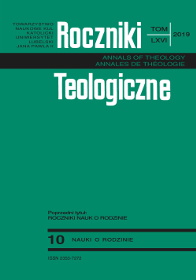Attitudes of a Family Towards Poker – the Results of a Qualitative Study of Poker Recreational and Professional Players
Abstract
Playing poker is quite a popular pastime, but it can be also an unusual form of work. Nevertheless, it can become an addiction having negative consequences for an individual person and the society, moreover, it is not accepted in this society. Therefore, playersʼ families may be concerned about the outcomes of taking up this game. It is confirmed by the results of the qualitative studies described in this article1. There were conducted 30 in-depth interviews with recreational and professional poker players aged 19-30, the purpose of which was, for example, to provide information on the family situation of poker players. The article presents the results related to the families’ attitudes towards the game, which were mostly full of fears and doubts. There were described reasons of their negative attitudes usually conditioned by the mechanisms of the social life and the fear of becoming addicted to the game, as well as their consequences related to further plans of the players. The article also mentions family relationships playing an important role in the acceptance of the game of poker.
References
American Psychiatric Association, Diagnostic and Statistical Manual of Mental Disorders Fifth Edition, Washington 2013.
Badora B., Gwiazda M., Herrmann M., Kalka J., Moskalewicz J., Oszacowanie rozpowszech¬nienia oraz identyfikacja czynników ryzyka i czynników chroniących w odniesieniu do hazardu, w tym hazardu problemowego (patologicznego) oraz innych uzależnień behawioralnych, Warszawa: Centrum Badania Opinii Społecznej 2012.
Badora B., Gwiazda M., Herrmann M., Kalka. J. Moskalewicz J., Rozpowszechnienie wy¬branych uzależnień behawioralnych i ich związek z używaniem substancji psychoaktywnych, Warszawa: Centrum Badania Opinii Społecznej 2015.
Baumeister R.F., Leary M.R., The Need to Belong: Desire for Interpersonal Attachments as a Fundamental Human Motivation, „Psychological Bulletin” 117(1995), nr 3,
s. 497-529.
Beekman J.B., Stock M.L., Marcus T., Need to Belong, Not Rejection Sensitivity, Moderates Cortisol Response, Self-Reported Stress, and Negative Affect Following Social Exclusion, „The Journal of Social Psychology” 156(2016), issue 2, s. 131-138, doi: 10.1080/00224545.2015.1071767.
Biolcati R., Passini S., Griffiths M.D, All-in and Bad Beat: Professional Poker Players and Pathological Gambling, „International Journal of Mental Health and Addiction” 13(2014), issue 1, s. 19-32, doi:10.1007/s11469-014-9506-1.
Braun-Gałkowska M., Psychologia domowa, Kraków: Wydawnictwo Naukowe Akademii ¬Ignatianum w Krakowie 2018.
Czajkowki M., Poker – gra szczęścia czy umiejętności? Przegląd analiz teoretycznych i empirycznych oraz wnioski dla regulacji, „Ekonomia” 2015, nr 40, s. 33-57.
Denzin N.K., Lincoln Y.S., Introduction: the discipline and practice of qualitative research, w: Handbook of qualitative research, red. N.K. Denzin, Y.S. Lincoln, Thousand Oaks CA: Sage Publications 2005, s. 1-45.
Dufour M., Brunell N., Roy E., Are Poker Players All the Same? Latent Class Analysis, „Journal of Gambling Studies” 2015, nr 31, s. 441-454, doi: 10.1007/s10899-013-9429-y.
Dzierzyńska-Breś S., Sytuacja społeczna rodzin osób pozbawionych wolności, Poznań: Wydawnictwo Naukowe UAM 2016.
Ferris J., Wynne H., The Canadian Problem Gambling Index: Final Report, Ottawa: Canadian Centre on Substance Abuse 2001.
Gaebel W., Zielasek J., Reed G.M., Zaburzenia psychiczne i behawioralne w ICD-11: koncepcje, metodologie oraz obecny status, „Psychiatria Polska” 2017, nr 51(2), s. 169-195, doi: https://doi.org/10.12740/PP/69660.
Hamer H., Psychologia społeczna: teoria i praktyka, Warszawa: Difin 2005.
Hopley A.A.B., Wagner J., Nicki R., Making a Living Online: Problem Gambling and Workaholism in High Earning Online Texas Hold’em Poker Players, „Journal of Gambling Issues” 2014, nr 29, s. 1-18, doi:10.4309/jgi.2014.29.5.
Kahneman D., Pułapki myślenia: o myśleniu szybkim i wolnym, Poznań: Media Rodzina 2012.
Kubiak-Krzywicka W., Interakcyjno-kontekstualny model zaburzonej socjalizacji, Poznań: Wydawnictwo Naukowe UAM 2010.
Lelonek-Kuleta B., Uzależnienie od grania hazardowego w rodzinie na tle wybranych kultur, w: Rodzina i tradycja – na pograniczu kultur i czasów, red. J. Gorbaniuk, Lublin–Kijów–Lwów 2015, s. 124-144.
Makaruk K., Wójcik S., EU NET ADB – Badanie nadużywania internetu przez młodzież w Polsce i Europie. Raport z badań, Warszawa: Fundacja Dzieci Niczyje 2012.
Mielecka-Kubień Z., Biolik J., Warzecha K., Wójcik A., Wybrane aspekty społeczno-ekonomicznych skutków uzależnienia od hazardu, „Zeszyty Naukowe Uniwersytetu Ekonomicznego w Krakowie” 2015, nr 4(940), s. 85-99.
Muda R., Śliwińska P., Pawelec A., I-graj z losem dzięki umiejętnościom. Jakie czynniki związane są z wysokimi osiągnięciami finansowymi w grze w pokera?, „Psychologia Ekonomiczna” 2014, nr 5, s. 26-28, wydanie internetowe: https://psychologia-ekonomiczna.com.pl/article/view/226.
Sproston K., Hing N., Palankay Ch., Prevalence of Gambling and Problem Gambling in New South Wales, Sydney: NSW Office of Liquor, Gaming and Racing 2012.
Wardle H., Moody A., Spencer S., Orford J., Volberg R., Jotangia D., Griffiths M., Hussey D., Dobbie F., British Gambling Prevalence Survey 2010, National Center for Social Research 2010.
Copyright (c) 2019 Roczniki Teologiczne

This work is licensed under a Creative Commons Attribution-NonCommercial-NoDerivatives 4.0 International License.





